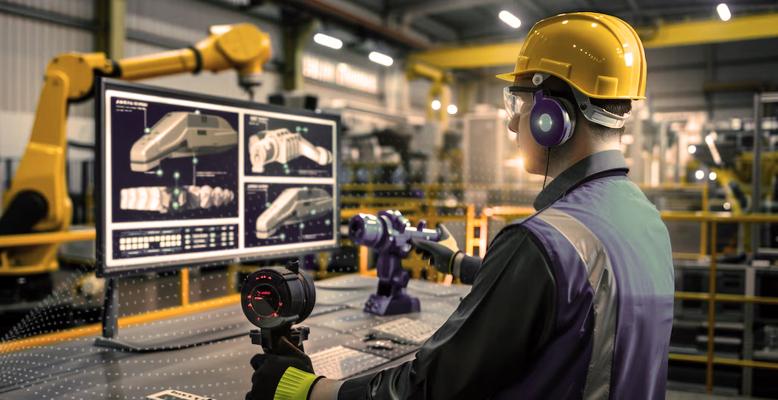
In the modern manufacturing landscape, Machine Learning (ML) is emerging as a game-changer, transforming traditional practices into smart, efficient, and highly optimized processes. As industries strive to keep pace with the demands for higher productivity and lower costs, ML is proving to be an invaluable asset. This blog explores the ways Machine Learning is revolutionizing manufacturing, from predictive maintenance to quality control, and how it’s shaping the future of the industry.
Machine Learning, a branch of artificial intelligence, involves training algorithms to analyze data and make predictions or decisions autonomously, without needing explicit programming. In manufacturing, ML is used to analyze vast amounts of data generated by machinery, sensors, and other sources to enhance operations, improve efficiency, and reduce costs.
Predictive maintenance is one of the most transformative uses of ML in manufacturing. Traditional maintenance schedules are often based on time intervals or usage metrics, which may lead to unnecessary downtime or unexpected failures. ML algorithms, however, analyze historical data and real-time sensor inputs to predict when equipment is likely to fail or require maintenance.
For example, General Electric (GE) has implemented ML-driven predictive maintenance in their aviation sector, resulting in a 10% increase in engine uptime and a 5% reduction in maintenance costs. By predicting failures before they occur, manufacturers can perform maintenance only when necessary, reducing downtime and extending the lifespan of machinery.
Maintaining high product quality is crucial in manufacturing, and ML plays a significant role in quality control. Traditional quality control methods often involve manual inspections, which can be time-consuming and prone to human error. ML algorithms, on the other hand, can analyze data from sensors, cameras, and other sources to detect defects and anomalies with high precision.
In a study conducted by the Fraunhofer Institute, ML-based quality control systems achieved an accuracy rate of 98% in detecting defects in automotive components, compared to 85% with traditional methods. This enhanced accuracy not only improves product consistency but also reduces waste and rework, leading to significant cost savings.
Predictive maintenance is one of the most transformative uses of ML in manufacturing. ML algorithms can analyze these variables and identify patterns or anomalies that may not be apparent through traditional methods. By optimizing processes, manufacturers can increase efficiency, reduce waste, and improve overall performance.
A notable example is Siemens, which implemented ML to optimize energy consumption in their manufacturing plants. By analyzing data from sensors and historical performance, Siemens reduced energy consumption by 15% and improved production efficiency. This optimization not only reduces operational costs but also promotes environmental sustainability.
Accurate demand forecasting is essential for effective inventory management and production planning. ML algorithms analyze historical sales data, market trends, and other factors to predict future demand more accurately than traditional methods. This leads to better inventory management, reduced stockouts, and minimized overproduction.
Walmart, for instance, uses ML for demand forecasting and inventory management, resulting in a 10% reduction in inventory costs and a 5% increase in sales. By accurately predicting demand, Walmart can ensure that the right products are available at the right time, improving customer satisfaction and operational efficiency.
The manufacturing supply chain is a complex network involving multiple suppliers, logistics providers, and distribution channels. ML enhances supply chain management by providing real-time insights into supply chain performance, predicting potential disruptions, and optimizing logistics.
Amazon is a prime example of using ML to enhance supply chain management. The company’s ML algorithms analyze data from various sources to optimize warehouse operations, route deliveries more efficiently, and predict potential supply chain disruptions. As a result, Amazon has significantly improved delivery times and reduced operational costs.
Safety is a top priority in manufacturing, and ML is playing a crucial role in enhancing workplace safety. By analyzing data from sensors, cameras, and other sources, ML algorithms can identify potential safety hazards, monitor compliance with safety regulations, and predict risks.
For instance, the use of ML in predictive safety analytics has helped companies like Honeywell reduce workplace accidents by 20%. By proactively identifying and addressing safety risks, manufacturers can create a safer working environment and reduce the likelihood of accidents and injuries.
To illustrate the transformative impact of ML on manufacturing, let’s examine a case study involving a leading automotive manufacturer. This company implemented ML to optimize its production line and reduce downtime.
By deploying ML algorithms to analyze data from sensors installed on production equipment, the manufacturer identified patterns and correlations that indicated potential issues before they became critical. As a result, they achieved a 15% increase in production efficiency, a 20% reduction in maintenance costs, and a 25% decrease in equipment downtime. This case study highlights how ML can drive significant improvements in manufacturing performance and profitability.
As technology continues to evolve, the role of Machine Learning in manufacturing is expected to grow even further. Emerging trends include the integration of ML with other advanced technologies such as the Internet of Things (IoT), robotics, and augmented reality (AR). These innovations will enable manufacturers to achieve even higher levels of automation, efficiency, and precision.
In the coming years, we can anticipate more widespread adoption of ML-driven solutions across various manufacturing sectors. Companies that embrace these technologies will likely gain a competitive edge, benefiting from enhanced operational efficiency, reduced costs, and improved product quality.
Machine Learning is revolutionizing the manufacturing industry by offering innovative solutions for predictive maintenance, quality control, process optimization, demand forecasting, supply chain management, and safety. As manufacturers continue to adopt ML technologies, they will experience significant improvements in efficiency, cost savings, and overall performance.
Ready to leverage Machine Learning for your manufacturing operations? Contact BizBrolly today to discover how our expertise can help you implement ML solutions tailored to your business needs. Embrace the future of manufacturing with smart, data-driven strategies and stay ahead of the competition!